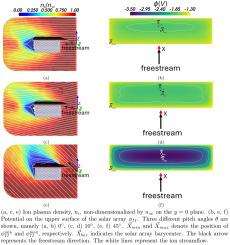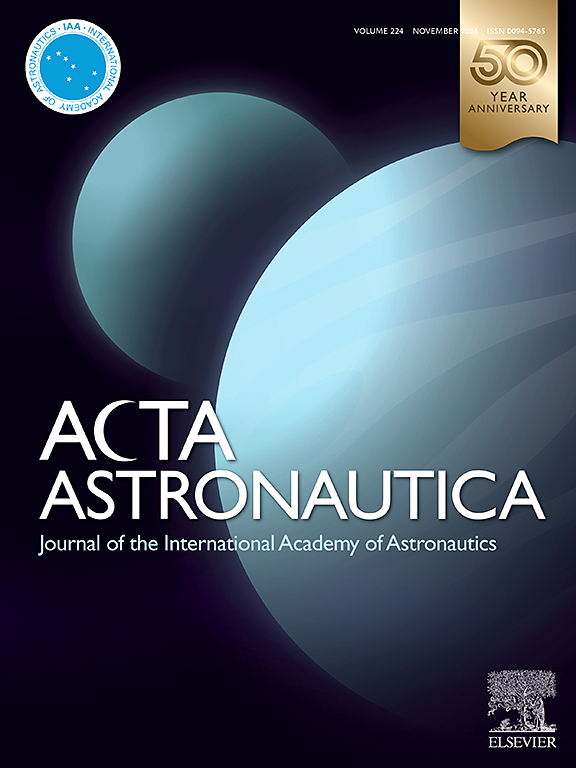Satellite surface charging in LEO with ProPIC
IF 3.1
2区 物理与天体物理
Q1 ENGINEERING, AEROSPACE
引用次数: 0
Abstract
ProPIC is a fully kinetic particle-in-cell (PIC) solver developed for space electric propulsion. This work has extended its capabilities to simulate satellite surface charging and wake generation in low Earth orbit (LEO). A novel scaling approach has been implemented, decreasing computational cost by more than one order of magnitude. The methodology and scaling approach have been verified against the revised orbital-motion-limited theory. The surface charging and wake generation in LEO have been examined for a satellite that is more complex and larger than what is typically handled with a fully kinetic PIC approach in LEO, particularly due to the presence of large solar panels. Notably, the simulated wake can be used to identify the optimal position for the plasma diagnostic sensor that minimizes interference with the wake. Moreover, despite not being a failure risk, the attitude greatly influences the surface charging of a satellite with large solar arrays installed parallel to the satellite speed vector. The study suggests that, for high positive pitch angles (45), the surface charging of the solar panels can increase by as much as 75% compared to low negative pitching cases. Additionally, the study highlights that the pitch angle and satellite envelope along the motion direction significantly influence the potential gradients on the solar panels.

利用 ProPIC 在低地轨道进行卫星表面充电
ProPIC 是为空间电力推进开发的全动能粒子入胞(PIC)求解器。这项工作将其功能扩展到模拟低地球轨道(LEO)上的卫星表面充电和尾流生成。采用了一种新颖的缩放方法,将计算成本降低了一个数量级以上。该方法和缩放方法已根据修订后的轨道运动限制理论进行了验证。对低地轨道上的表面充电和尾流生成进行了研究,该卫星比通常在低地轨道上采用全动能 PIC 方法处理的卫星更复杂、更大,特别是由于存在大型太阳能电池板。值得注意的是,模拟尾流可用于确定等离子诊断传感器的最佳位置,从而最大限度地减少对尾流的干扰。此外,尽管不存在故障风险,但姿态会极大地影响安装了与卫星速度矢量平行的大型太阳能电池阵列的卫星的表面充电。研究表明,在高正俯仰角(45∘)情况下,太阳能电池板的表面充电比低负俯仰角情况下增加 75%。此外,研究还强调,俯仰角和卫星沿运动方向的包络线对太阳能电池板上的电势梯度有显著影响。
本文章由计算机程序翻译,如有差异,请以英文原文为准。
求助全文
约1分钟内获得全文
求助全文
来源期刊

Acta Astronautica
工程技术-工程:宇航
CiteScore
7.20
自引率
22.90%
发文量
599
审稿时长
53 days
期刊介绍:
Acta Astronautica is sponsored by the International Academy of Astronautics. Content is based on original contributions in all fields of basic, engineering, life and social space sciences and of space technology related to:
The peaceful scientific exploration of space,
Its exploitation for human welfare and progress,
Conception, design, development and operation of space-borne and Earth-based systems,
In addition to regular issues, the journal publishes selected proceedings of the annual International Astronautical Congress (IAC), transactions of the IAA and special issues on topics of current interest, such as microgravity, space station technology, geostationary orbits, and space economics. Other subject areas include satellite technology, space transportation and communications, space energy, power and propulsion, astrodynamics, extraterrestrial intelligence and Earth observations.
 求助内容:
求助内容: 应助结果提醒方式:
应助结果提醒方式:


